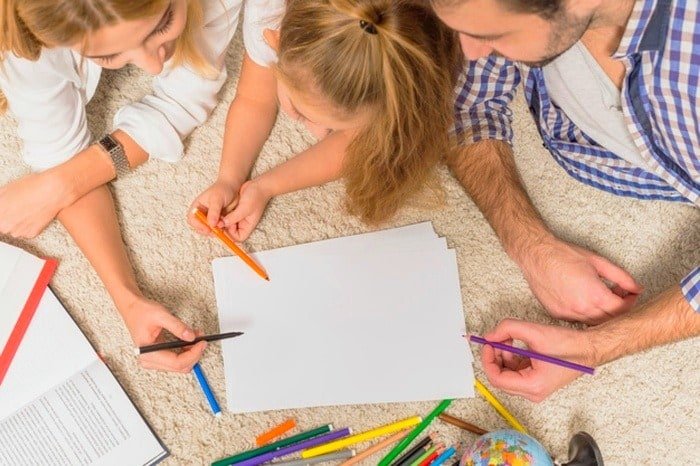Key things parents must know and follow
We have talked numerous times about the importance of child-rearing and looked at the parent’s influence on this issue from different perspectives. You all know that every single action and word from us as parents has a significant impact on our children, who will shape the future. Therefore, they must be adequately prepared and trained to manage their thoughts and behaviors as they grow older.
Parenting is not easy, and everyone agrees it’s challenging. Therefore, parents need to avoid certain actions and remain committed to them. This is a crucial aspect of the family.SelMagzWe will discuss a list of things parents should avoid.
1- Don’t forget to tell your children that you love them
We often become so involved in our daily routines that we forget to express our love to our children. Telling them you love them does not spoil them; instead, it demonstrates your affection.

2- Avoid criticizing them and convey your intentions through behavior
Words are usually easier than actions, but in some situations, talking may not be effective. Focus on your actions instead. When your child misbehaves, rather than saying that action is wrong, explain that their behavior is unacceptable and suggest alternatives.
3- Don’t be afraid to say “no”
Children benefit greatly from structure and routine. Don’t worry about giving a reason for saying no. Even if your child sulks for a while, they will learn that when parents say no, there is always a valid reason behind it, even if it leads to hours of crying. They will eventually understand the meaning of ‘no.’
4- Do not compare
This is tough, but try to avoid comparing your children to their peers and, most importantly, to their siblings.

5- Do not humiliate your child in public
This can be difficult. Imagine your toddler grabs a cookie at a store without permission! Nonetheless, it’s better to address poor behavior privately and discreetly rather than in front of others.
6- Don’t overprotect them
If the outcome of what your child is doing is not excessively harmful or dangerous, don’t overly restrict them from every activity. This is part of their learning process.
7- Remember to hug them
We all enjoy being hugged, even when our children have grown. It’s important to hug them regularly.

8- Never ignore listening to your children
In our noisy, electronics-filled world, remember to set aside time to listen to your child. They may have something very important to share with you.
Learn to be a strong listener. Let your child talk, listen to what they say, and then recap what you heard so they know you have been paying attention.
9- Don’t skimp on setting boundaries
Establishing limits for bedtime and visiting times is crucial so children know the rules. Be firm yet kind.
10- Respect their privacy
Just as we, as parents, appreciate our privacy, so do our children. Provide them space, respect their boundaries, and keep an eye on them from a distance.

11- Limit your child’s choices
Allow your child to make choices, but try to limit the options you present, especially for younger children, as too many choices can be overwhelming for them.
12- Don’t do everything for your child
This might seem hard because we think if we let our children handle things, things will take longer. However, sometimes stand firm against your child’s insistence and encourage them to do tasks on their own, as it prepares them for life.
13- Remember to spend time with them
Don’t forget to allocate time for your child.
These days, we are all busy with our hectic lives. Yet sometimes, just an hour spent with your child can be fantastic for both of you. The most effective action you can take is to spend 20 minutes a day doing whatever they want with them.

14- Avoid hard discussions
Avoid discussing topics such as substance abuse and so on, as you must be there to talk to them when they find themselves in that situation and need guidance from you, as these issues might come too early and be inappropriate for them.
15- Don’t always make decisions for your child
Try not to make decisions for your child constantly. We all know that parents have the right to decide for their children, but they need to learn to think for themselves and live with the consequences of their choices.
16- Don’t be afraid of parenting
You can be your child’s friend, but never let them forget that you are their parent. This is what they need most, so fulfill your role well to be a great example for your child.

17- Don’t force your child to learn every activity
Never enroll your child in multiple classes if they have no interest in them. Attending school already fills much of their time, and sometimes they need to play and rest. If you intend to enroll them in a specific class, ensure you ask their opinion and whether they’re interested in joining.
18- Don’t compare yourself to other parents
Parenting is hard, especially if you start comparing yourself to others. Be yourself and trust your instincts; no one knows your child better than you do.
19- Don’t complain
If you have a request from your child and they don’t respond quickly, don’t grumble. Instead, try to praise them when they do something right and offer rewards. If their actions yield negative results, remind them before they finish their task.

20- Keep your cool
This is certainly one of the hardest tasks. Most children respond better to a request or command spoken gently. When you need your child’s attention, it’s necessary to remain calm to help them recognize their mistakes.
21- Don’t stop reading to your childThe importance of readingKeep reading to your child
Continue reading to your child. Read them stories at bedtime and cuddle with them. You can take turns reading stories to each other, which will also encourage them to read.
22- Don’t forget to laugh with your child
Don’t forget to share laughter together. Sometimes being a parent gets tough, but ensure you laugh together again and again from the heart.
23- Don’t hesitate to apologizeFor anything you do wrongDon’t be afraid to apologize if you make a mistake. This is very important, as children learn from you. So, when you make a mistake, apologize and express regret.
24- Don’t give up

Never back down, don’t threaten, and don’t take action without following through. Repeatedly warning your child without enforcing the consequence teaches them that they can continue misbehaving. However, remember they need to see the results of their bad behavior. Begin with a warning and then give them a chance, and if they repeat their mistake, step away from them for a short while.
25- Don’t be too hard on yourself
We all want to be perfect parents, but we inevitably make mistakes. Don’t rush to criticize your parenting skills and expect to handle everything perfectly. Instead, enjoy your time, as this is what children truly need.
26- Don’t ignore their mind and brain
Their mind controls everything. Their thoughts, behavior, and communication are all governed by their mind. When their mind functions properly, they will perform tasks effectively. When there is a problem in their mind, life will become difficult for them.
If they struggle in life, you will also face challenges. So, if you want your child to be their best self, take care of their brain and teach them how to do the same.
27- Avoid using negative language

Never tell your child, “You are a troublemaker and a bad person,” as they may internalize these negative words and start believing them.
28- Keep an eye on your child
Human brain lobes that control planning, judgment, and impulse control are not fully developed until around the age of 25. Therefore, you need to monitor your child until then. This means checking what they are doing and who they are spending time with. You don’t need to interfere in their activities, but you should be vigilant and supervise their actions.
29- Don’t overlook their mental health issues
On average, it takes 11 years from initial evaluations until children show signs of a
mental illnessfighting symptoms ofADHDoranxietyanddepressioncan negatively impact their ability to succeed in school, friendships, and in life.30- Don’t ignore your own mental health issues
If you suffer from a mental illness—whether it’s PTSD or bipolar disorder, etc.—it can also affect your children and devastate their lives. Remember to take care of yourself first and be the best version of yourself to be the best parent for your child.
Proper child upbringing







